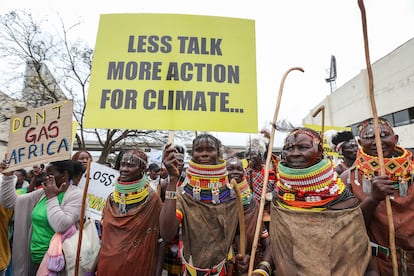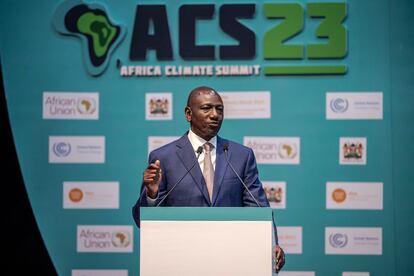Africa holds its first climate summit in search of homegrown solutions
The Nairobi conference is aiming to build a united front ahead the COP28 meeting in Dubai later this year

Speech after speech, conversation after conversation, the message from the African Climate Summit (ACS) is consistent. Africa must lead the fight against climate change. The West can no longer impose solutions on the continent: African solutions for African problems. “A call for cooperation and solidarity from African countries is needed,” former Nigerian Vice President Yemi Osinbajo told EL PAÍS. “We cannot pursue climate action through insular, solitary policies. Global warming cannot be mitigated by air-conditioning our little pockets and corners of the world,” declared Kenyan President William Ruto on Tuesday.
Some 20 heads of state and government are participating in the first-ever African Climate Summit, being held in Nairobi from September 4-6. The overarching goal is to forge a united front for the upcoming United Nations Climate Change Conference (COP28) in Dubai. The leaders want tangible solutions and financing that will not go up in smoke. The previous COP, in Egypt in 2022, ended with an agreement to create a fund via which the most vulnerable countries can mitigate the losses and damages of global warming, but without specifying exactly who will finance it, in what proportion, or how it will be distributed.
The solutions, insist several experts, must come from Africa. Osinbajo, who is attending the summit as an advisor to environmental organizations, gives examples of local policies that have recently proven effective, such as the Lake Turkana wind power project in Kenya, which, he says, reduces emissions while providing energy to rural communities, or the Great Green Wall initiative, which regenerates degraded land with plantations that improve soil fertility.
“When you are sitting, for example, in Madrid, your lived realities are fundamentally different from those of a person sitting in Lagos,” says Murefu Barasa, founder of the African consulting firm EED Advisory. “We have to ensure that we are not just talking but having the right conversations. We can talk of futuristic goals like smart grids, green hydrogen and e-mobility, but we have to remember that in Sub-Saharan Africa most families are still cooking using traditional charcoal or wood.” Another proposal coming from the West — that of French President Emmanuel Macron after the meeting he organized with leaders of developing countries in June — to impose new taxes on international air and maritime transport, also raises questions for Barasa: “We would have to make sure that the cure is not worse than the disease. We have to ensure that there are no negative repercussions on exports from Africa, the service industry such as tourism, and other sources of foreign exchange”.
The fund agreed at the 2022 climate summit in Egypt, which is expected to be finalized at the next COP in December, is vital for a continent hit hardest by the climate crisis. Although Africa contributes between just 2% and 3% of the world’s total greenhouse gas emissions, according to the United Nations, it is the region of the world that is most vulnerable to natural disasters caused by climate change. The World Meteorological Organization’s 2022 State of the Climate report shows an alarming acceleration of rising temperatures in Africa and warns that funding to adapt to the new climate reality is a “drop in the ocean” of immediate needs. More than 110 million people on the continent were directly affected by climate-related issues last year, according to the same report. Countries such as Ethiopia, Kenya, and Somalia are experiencing their worst droughts in four decades, and Cyclone Freddy left tens of thousands displaced in Mozambique and Malawi in March.

“Our strengths outweigh our weaknesses”
Africa loses between 5% and 15% of its GDP growth every year due to the effects of climate change, according to Kenya’s President Ruto. But the continent does not want to be seen as merely a victim of the crisis, ACS organizers insist. “Our strengths outweigh our weaknesses and our potential to contribute positively to the world far outweighs our need for assistance,” Ruto said in his opening speech. The Kenyan leader noted that Africa contains vast deposits of natural resources, such as cobalt, that are needed for the transition to renewable energies worldwide.
This potential is currently untapped. Africa has an average of 300 days of sunshine per year, but contains only 2% of global solar power generation facilities, according to Osinbajo. There is also “unlimited potential” in hydropower, wind, and geothermal energy, according to the African Development Bank. Meanwhile, 600 million people (more than 40% of the population) do not even have access to energy. “African countries have to go green before they industrialize, and not the other way around, as other countries that could afford it did,” Ruto stressed at the summit.
It remains to be seen what tangible solutions come out of the ACS, jointly organized by the Kenyan government and the African Union (AU). One concrete proposal has already been put forward by Ruto, who is betting on carbon credits. The United Arab Emirates committed on Monday to the purchase of $450 million from the African carbon credit market, a controversial mechanism against climate change that consists of the purchase of carbon absorbed by forests anywhere in the world by polluting companies. Many activists consider these purchases a form of neo-colonialism and question the methods used by some of these multinationals, as in the case of Kenya, where they denounce that certain conservation projects have resulted in the expulsion of farmers from the land where they earn their living.
Despite the message of the summit focusing on Africa’s ability to fight the climate emergency, the event has been criticized for being overly influenced by Western actors. “We thought this summit could prepare us to come to the Dubai COP as a united front,” says Maimuna Kabatesi, head of programs at the pan-African NGO Voices for Climate Action. In her view, this was not the case. She, like other activists, criticizes the lack of participation of indigenous communities and members of civil society. “They deny entry to members of civil society in Africa and prioritize the participation of the private sector from Europe or the United States. It is not a people-centered summit, but a summit focused on economic benefits.”
Sign up for our weekly newsletter to get more English-language news coverage from EL PAÍS USA Edition
Tu suscripción se está usando en otro dispositivo
¿Quieres añadir otro usuario a tu suscripción?
Si continúas leyendo en este dispositivo, no se podrá leer en el otro.
FlechaTu suscripción se está usando en otro dispositivo y solo puedes acceder a EL PAÍS desde un dispositivo a la vez.
Si quieres compartir tu cuenta, cambia tu suscripción a la modalidad Premium, así podrás añadir otro usuario. Cada uno accederá con su propia cuenta de email, lo que os permitirá personalizar vuestra experiencia en EL PAÍS.
¿Tienes una suscripción de empresa? Accede aquí para contratar más cuentas.
En el caso de no saber quién está usando tu cuenta, te recomendamos cambiar tu contraseña aquí.
Si decides continuar compartiendo tu cuenta, este mensaje se mostrará en tu dispositivo y en el de la otra persona que está usando tu cuenta de forma indefinida, afectando a tu experiencia de lectura. Puedes consultar aquí los términos y condiciones de la suscripción digital.









































